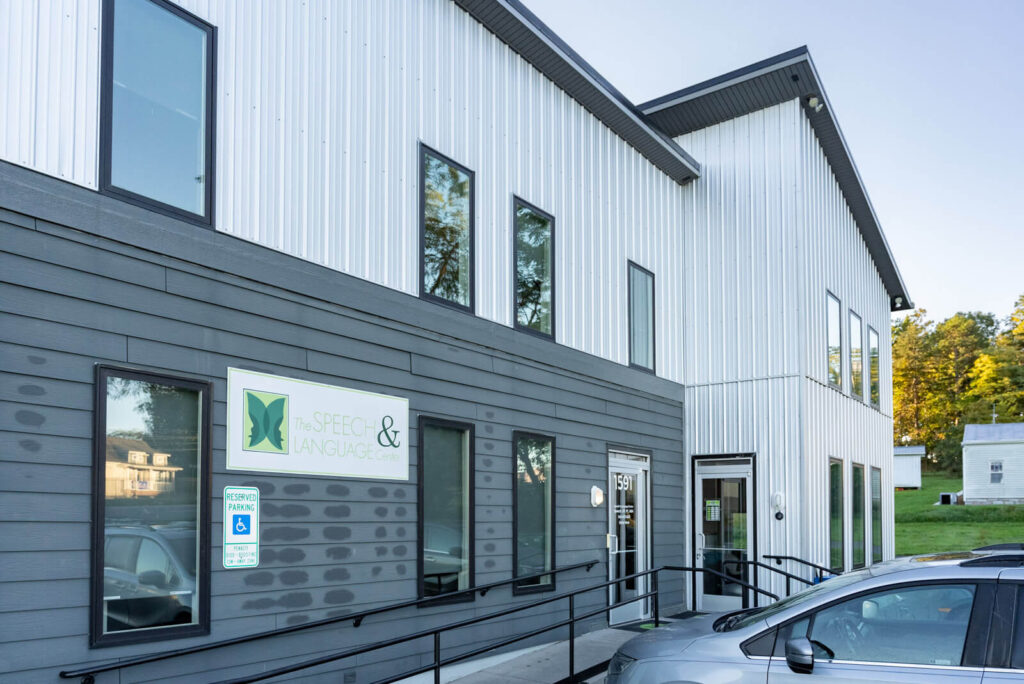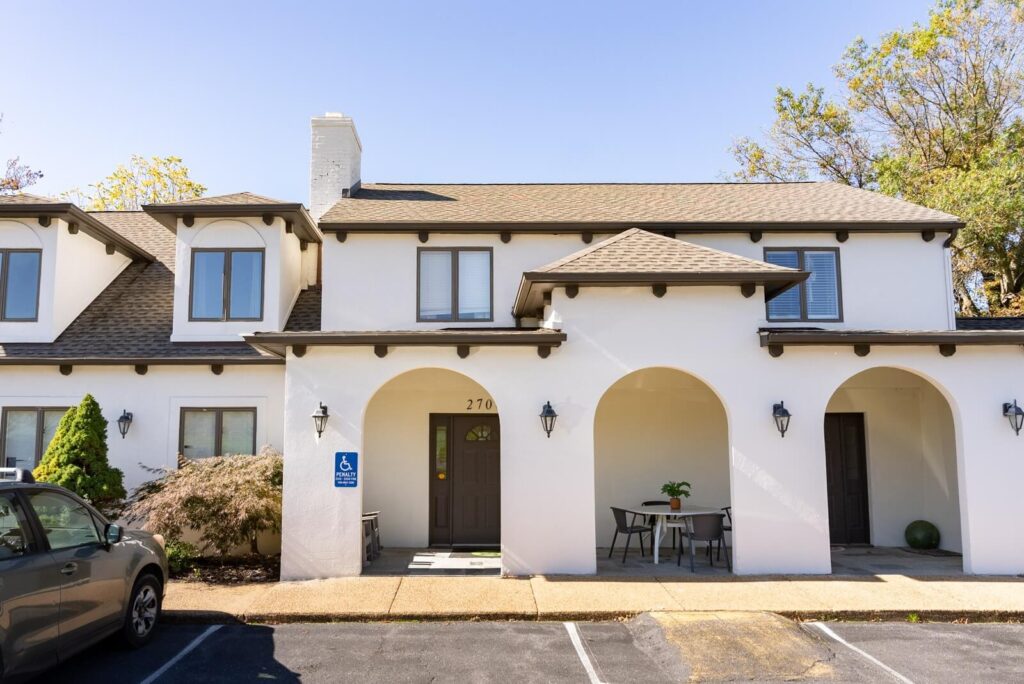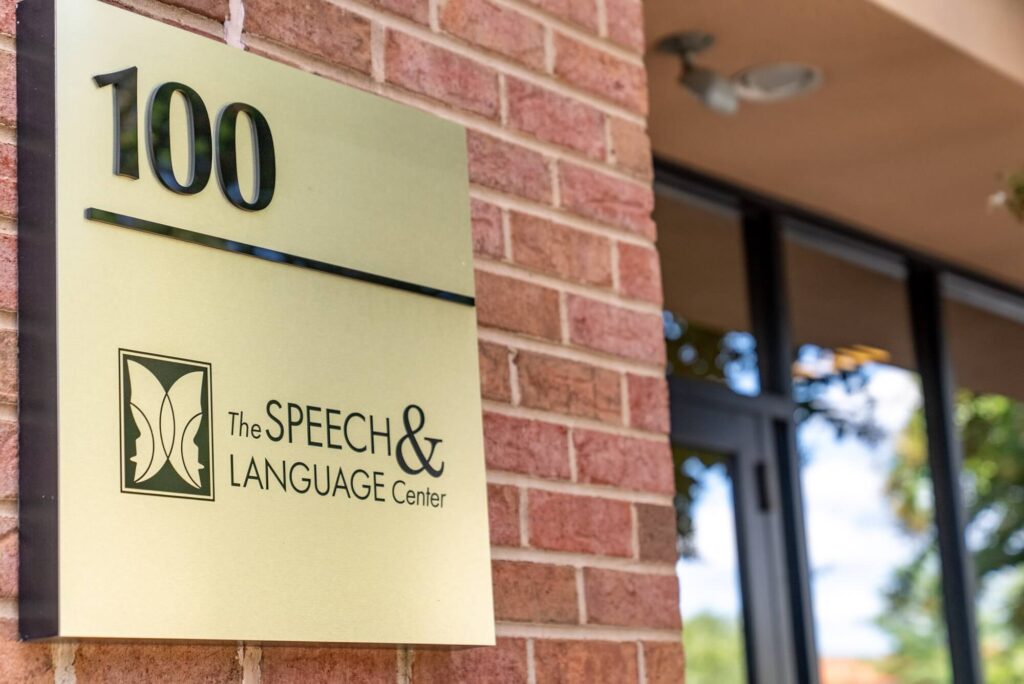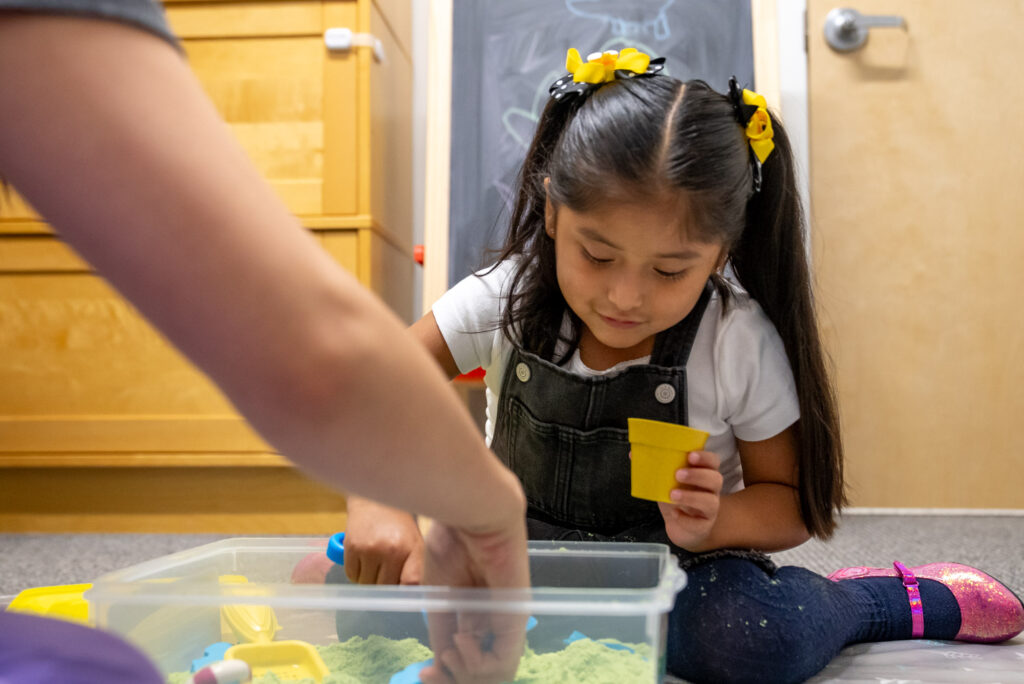Occupational Therapy at SLC
Our occupational therapists support clients in developing fine motor skills, self-care abilities, and sensory regulation to help them succeed in all areas of life.
How Occupational Therapy Helps
We all need to feel able to take care of ourselves and our daily tasks with confidence. No matter what physical, emotional, neurological, or sensory challenges we may be facing, we can all progress towards our goals and navigate our world more readily with a little knowledgeable support and the right tools.
Occupational therapists help people across the lifespan participate in meaningful tasks and activities independently in the home, school, community and work environments. Activities of daily living include dressing, bathing, toileting, grooming and eating and some instrumental activities of daily living include meal preparation, clothing care, cleaning, shopping, and care of others/pets.
What is Occupational Therapy?
Have you ever wondered what happens in an Occupational Therapy session, or what makes Occupational Therapy different from Physical Therapy and not at all like Career Counseling?
Did you know that all of us, even children, have “occupations?” (Hint: in this context, ‘occupation’ is not another word for ‘career.’) Many people need Occupational Therapy for identifying unique individual barriers and strengthening specific skills in order to enhance their ability to do the things they’d like to do, and our Occupational Therapists can help.
What do Occupational Therapists Treat?
Our clients may come to Occupational Therapy seeking support with:
- Activities of daily living (ADLs)
- Attention
- Developmental milestones
- Dynamic Movement Intervention
- Emotional regulation
- Feeding
- Low muscle tone
- Play skills
- Torticollis Treatment
- Visual Perception
- Fine motor skills development (e.g. Handwriting, Grasp)
- Gross motor skills development (e.g. sitting, standing, walking, reaching, throwing, catching)
- Infant massage
- Neuromotor
- Sensory processing and integration
- Visual Motor Integration
Our Occupational Therapists hold Masters or Doctoral degrees, are licensed in the state, and are nationally registered by NBCOT.
Our therapists are skilled in treating sensory integration and processing, fine motor, neurodevelopment, physical disability, vision, feeding, and motor coordination. Specific certifications and training include:
Sensory Integration and Praxis Test (SIPT) Certified
Pediatric Conferences:
VOTA School Symposium
AOTA Pediatric Specialty Conference
Who Can Benefit From Occupational Therapy?
Occupational therapists work with individuals 0-99+, though at the Speech and Language Center our OTs primarily work with the pediatric population (infant to young adult age). OTs work with individuals who may have diagnoses due to a developmental delay, injury, disability, or illness. Some of the most common diagnoses include Autism Spectrum Disorder, Cerebral Palsy, Down Syndrome, Stroke, Attention Deficit-Hyperactivity Disorder, Oppositional Defiance Disorder, genetic disorders and more.
Are School-Based and Outpatient Occupational Therapy Different?
Outpatient occupational therapy follows a medical model while school based OT follows an educational model. Outpatient occupational therapists work with individuals to enhance functional participation in the home, community and school setting, while school occupational therapists support the student through academic challenges.
Outpatient therapy is able to address a wider variety of skills usually on a one-to-one basis and emphasizes a family-centered approach, often including the parent/caregiver through the evaluation, goal setting, and discharge process. Outpatient OTs can use a variety of intervention strategies including but not limited to: play, sensory integration, strengthening, handwriting, coordination, fine motor, visual perceptual, and socialization skills.
There is some overlap in these closely related services, but the differences in scope of practice help us to clarify when there may be a need for both school-based as well as outpatient services, and why in some cases only one or the other is needed.
References:
Palladino, B. (2019). Outpatient vs. School-Based Occupational Therapy. Brains Potential.
Retrieved from: https://brainspotential.com/outpatient-vs-school-based-occupational-therapy/
Stoffel, A. & Schleis, R. (2014). Frequently Asked Questions (FAQ): What is the Role of Occupational Therapy in Early Intervention?. The American Occupational Therapy Association. Retrieved from:
https://www.aota.org/~/media/ Corporate/Files/Practice/Children/Browse/EI/Role-of-OT_1/Early-Intervention-FAQ.pdf
Benefits of Occupational Therapy
Build Independence
Develop Motor Skills
Address Sensory Needs
Improve Emotional Regulation
Achieve Developmental Milestones
Our Locations

Occupational Therapy in Harrisonburg, VA (Port Republic Road)

Occupational Therapy in Harrisonburg, VA (Spotswood Trail)

Occupational Therapy in Loudoun County, VA (Ridgetop Circle)
What Families Are Saying
Read inspiring stories of progress and growth from the people we’ve helped.
We’ve had such a great experience at the Speech and Language Center. Adrienne always personalized the activities for our son, was so encouraging, and communicated well with us on how we could practice at home with our son. We are so grateful for all the progress he’s made from the sessions at the Speech and Language Center!
~ Maria
Parent
“We absolutely love this facility! Max has been shown so much love and appreciation since beginning last year. Since we started coming to the actual office, he has loved being with Ms. Mary Kate, and Ms. Jenny!
His speech has improved so much and we are truly grateful for the time that has been taken to help him out.
10/10 all around! We are so thankful 😌”
~ Erin
Parent
Amazing just one word to describe both of my son’s therapist Mary-Kate and Megan are absolutely incredible! I just have a few weeks in and I’m all ready seeing my son speak more freely! Just saying “Good Morning” with out me telling him to say it! I’m just so thankful! ?? thank you !
~ MD
Parent
“Highly recommend for anyone needing pediatric Occupational Therapy (OT) that is covered by most insurances. My child has been a client for more than two years. We drive 30 minutes each way twice a week for their OT services – and the drive is totally worth it. This place is staffed on all levels by people who really, really care. Our OTs are Chloe and JJ and they have been just fantastic addressing my child’s complex needs. We have considered adding speech therapy as well because all the speech therapists are also so kind and welcoming.
I also want to call out Kayla and Stefany in the front office who are so incredibly helpful and good at their jobs. I have called so many times with scheduling changes and questions and they are, without fail, professional and kind.”
~ Chris
Parent
“We just started here but have loved every bit! Ms. Daria was very thorough in her initial evaluation and my son has looked forward to coming back. Ms. Valeria has made scheduling and setting up billing very smooth as well.
The office is cheerful and clean and in a great location (ground level, lots of parking.)
While we are just starting our journey we expect things to continue to go great!”
~ Kristen
Parent
My child had an amazing experience seeing Courtland for speech therapy. She is so engaging with young children and always found creative ways to incorporate his interests into sessions. She also provides detailed recaps of sessions and helpful guidance for further learning at home! Thank you so much to Courtland for your hard work and dedication!
~ Liza
Parent
My daughter has been receiving services here for more than 3 years. We’ve been very happy with every therapist that we have seen. They are all very caring and passionate about what they do. The building is always clean and well kept. In all the time we’ve been going here, we’ve never had a negative experience.
~ Heaven
Parent
Find Answers to Your Questions
You may have questions about our services and how we can help. Here are some of the most common ones:
What is occupational therapy?
What age groups do you work with?
Who can benefit from occupational therapy?
What challenges can occupational therapy address?
How is outpatient OT different from school-based OT?
Are your therapists certified?
Our Occupational Therapists hold Masters or Doctoral degrees, are licensed in the state, and are nationally registered by NBCOT. Our therapists are skilled in treating sensory integration and processing, fine motor, neurodevelopment, physical disability, vision, feeding, and motor coordination. Specific certifications and training include:
- Sensory Integration and Praxis Test (SIPT) Certified
- Pediatric Conferences:
- VOTA School Symposium
- AOTA Pediatric Specialty Conference

Let’s Build Skills Together

